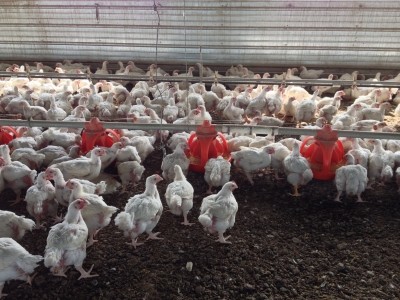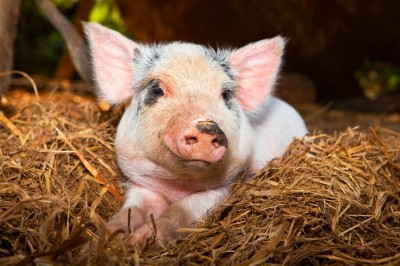'We're building the evidence base for the benefits of using phytase in pig feed,' says DuPont Animal Nutrition

We caught up with Dr Gary Partridge, development and technical director at DuPont Animal Nutrition, to hear how the global giant’s scientists are building the evidence base for phytase use in the pig sector given the explosion in demand it has seen for the additive in the past few months.
“We are actively running trials, in the US market in particular, evaluating phytase inclusion in the diet of pigs throughout the whole life cycle, not a common approach on the phytase supply side given the relatively higher costs involved in pig trials as opposed to poultry ones due to the longer life cycles involved.
In reality, some companies tend to take a broiler based model and apply that to the swine sector but we think extrapolating work from broilers to pigs is unacceptable, given their differing digestive physiology.
We are assessing the benefits of phytase inclusion in the diets of pigs of all ages and across all weights," he said.
Young pig diets
Inorganic phosphorus prices have risen substantially, one factor that has been encouraging a switch to phytase supplementation in feed, said DuPont.
Migration away from the use of porcine products in feed due to growing concerns they could be a potential transmitter of the porcine epidemic diarrhea (PED) virus is also a trigger for greater take-up of phytase in the pig segment.
“We are being asked more and more to help design the diets of young pigs.
Many producers are trying to determine the right level of phytase to include when re-structuring diets for piglets to improve the digestibility of the vegetable sources used to replace animal protein and to offset the anti-nutrient effect of the additional phytate that can result from a more plant based feed," said Partridge.
EU phytase approval
Subject to the necessary regulatory approvals being in place, DuPont said its Buttiauxella phytase, Axtra PHY, is likely to get EU backing for use with all livestock species by the end of 2015.
“It is critical to try and get approval for as many species as possible in regulatory applications as our target customers tend to provide feed for multi-species and are not interested in products that have been authorized for use with broilers only, for example.
But it makes the process quite time consuming given the multiple, supporting data sets that are required," said Partridge.
The additive, he said, brings cost savings to the swine sector due to its ability to release 20% more phosphorus and calcium into pig diets and 10% more digestible energy as well as subsequent lower manure management costs due to a reduction in phosphorus excretions.
It is already authorized in the US, Brazil, Egypt, Pakistan, South Africa, Taiwan and Thailand “with Turkey imminent,” he added.
December last year saw DuPont Animal Nutrition get US Food and Drug Administration (FDA) approval for use of that phytase product at a lower dose level for swine - 250 FTU per kilo of feed.
Antibiotic alternatives
With the feed and livestock industry continually looking for alternatives to antibiotics to maintain animal health, DuPont has also been investigating interactions between its own feed enzymes, probiotics and betaine portfolio, with a focus on the gut microbiota and associated changes.
“But there is no magic bullet,” said Partridge. “We see our technologies as part of the solution in supporting industry’s move away from a reliance on antibiotics.”
The company launched a xylanase, amylase, protease and multi-strain Bacillus combination, Syncra AVI, targeted at the poultry sector, at the IPPE show in Atlanta in January. “US customers are currently trialing the enzyme and probiotic product,” said Partridge.
DuPont scientists have been looking at its effectiveness in both disease challenged and unchallenged birds through extensive trialing, he added.
The supplier claims the combo product gives a 14% net improvement in relative cost per pound live-weight gain for birds infected with Clostridium perfringens and also gives ROI from improved digestibility and gut health support in healthy birds.
“We intend to research how our ingredients react with the whole gamut of feed additives on the market, not necessarily through partnerships, but looking at them independently so that we can provide a strong armory of information to support gut health innovation,” said Partridge.
Meanwhile, the aquaculture sector, particularly in the Asian Pacific market, is also on DuPont's radar in terms of phytase R&D.
“Again, we see a segment looking for substitutes to a feed input – in this case – fishmeal without there being a negative impact on performance, growth, feed conversion ratio, health or fish quality. We are exploring what dosage of phytase is needed to improve the digestibility of soymeal for the sector,” he added.


![[pic: (c) istock.com]](/var/wrbm_gb_food_pharma/storage/images/_aliases/wrbm_medium/1/3/6/9/1869631-1-eng-GB/Dow-and-DuPont-to-merge-pending-anti-trust-scrutiny.jpg)









